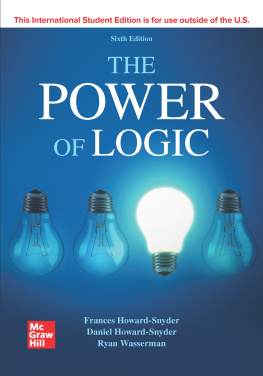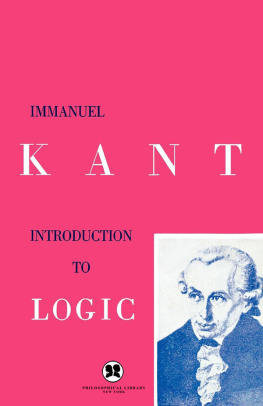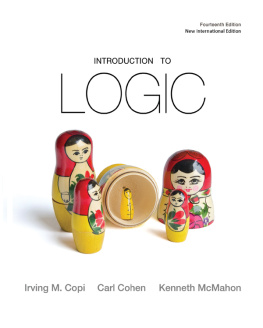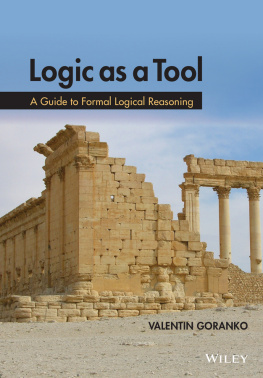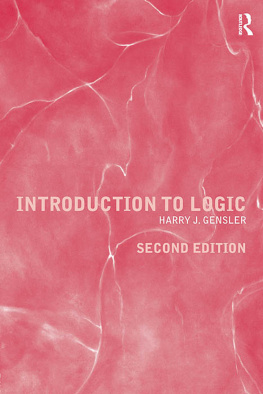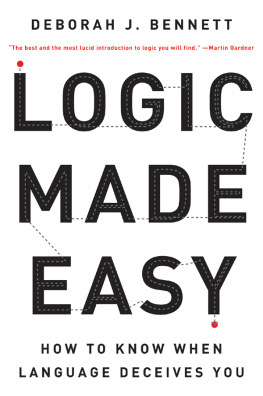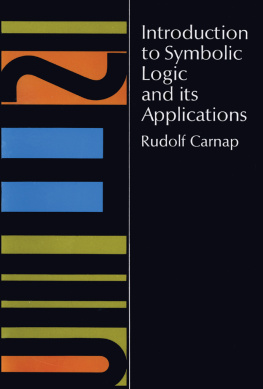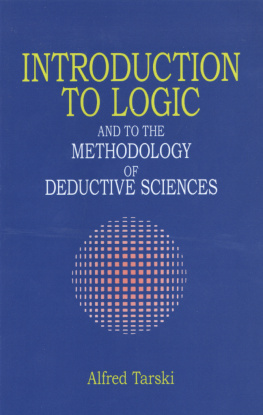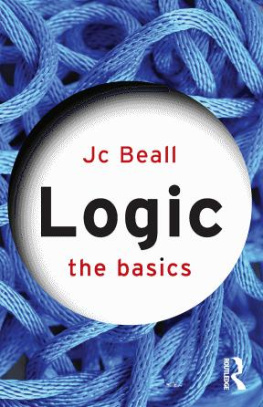LOGIC
A Complete Introduction
Siu-Fan Lee
Contents
Meet the author
Siu-Fan Lee studied Philosophy, Politics and Economics at the University of Oxford and obtained her doctoral degree in Philosophy at Kings College London. She is Assistant Professor at the Department of Religion and Philosophy, Hong Kong Baptist University. Her expertise covers Philosophy of Language, Philosophical Logic and Philosophy of Mind.
Siu-Fans research focuses on the philosophy of names, in particular empty names such as fictional names. She teaches extensively at many universities in the UK and Hong Kong. Her courses include Logic, Critical Thinking, Problems of Philosophy, History of Modern Philosophy, Philosophy of Language, Philosophy of Mind, Philosophy of Science, Philosophy of Religion, Political Philosophy, Environmental Philosophy and Postmodernism, not to mention Epistemology, Metaphysics, Ethics and specific philosophers like Descartes, Kant, John Stuart Mill and Wittgenstein.
An analytic philosopher by training, Siu-Fan also appreciates diversities such as ideas in Continental Philosophy and Chinese Philosophy. She is active in seeking a comprehensive understanding and dialogue between different perspectives and traditions.
Introduction
Human beings are interested not only in what things are, but also in how things could be. To achieve the latter, we need to understand how things are connected and why, so that we can play around with possibilities and derive things we do not know yet from what is known already. Hence, for instance, we deduce that Socrates is mortal because all men are mortal and Socrates is a man. We see black clouds looming and know that rain will come soon because we reason that if there are black clouds, then it rains, and now there are really black clouds. Similarly, we observe most swans are white, so we infer that all swans are white (even though in fact they are not). All these examples involve reasoning or inference. Ever since humans have sought to answer why we believe this and that, we have been constantly engaged in the truth of individual statements as well as the connections between them.
Logic studies reasoning; it is the study of the methods and principles to distinguish good from bad reasoning. Very often the relationship between individual statements depends on the form or structure of the arguments, rather than their actual content. Logic focuses on studying the forms or structures of arguments. So logic is abstract. However, this feature also gives logic a universal and general character. Exactly because content does not matter, logic is widely applicable in all intellectual pursuits regardless of their subject.
This book introduces three basic logical systems: categorical logic, propositional logic and predicate logic. It identifies in each system an essential method to test arguments: the Venn diagram method for categorical logic, the truth-table method for propositional logic, and natural deduction for predicate logic. There are plenty of illustrations and exercises to enhance your mastery of these skills. Each system involves an insight into analysing ordinary language, too, so logic can be related to our everyday use of language. Categorical logic analyses the subject-predicate structure within a sentence. Propositional logic focuses on the connections between simple sentences. Predicate logic combines insights from both, and provides a very powerful tool to analyse complex thoughts and relations. These systems and methods are chosen for their intuitive appeal and wide applicability to everyday argumentation. Advanced readers, however, may want to go deeper and get to know other complicated systems.
Apart from formal knowledge, this book also discusses the nature of meaning. It introduces some informal fallacies about meaning, the use of language and the relationship between premises and conclusion. This is useful for identifying bad reasoning in our daily lives. This book is therefore positioned between critical thinking and logic more formal than a standard critical thinking course, but less technical than a pure logic curriculum.
This book aims not only to help you to master the methods in elementary logic but also to understand the ideas behind it. By the time you have finished reading the book, I hope that you will understand the way in which logicians think and start to think like them! Of course, all systems have limitations, and its important that you understand what these are in order to apply the logic skills appropriately in your daily life.
In the book, I adopt a dialogue approach and invite you to follow me in my inquiry; there will be opportunities to practise what you have learned with exercises, and to consolidate what you have learned with reflection questions. You do not need to have any prior background in logic or mathematics to understand this book. Suggested answers for exercises are provided at the back of the book. Key technical terms are in bold in the text and explained again in the Glossary at the back of the book.
What is logic?
In this chapter you will learn about:
what logic is
what an argument is
deduction and induction
truth and validity
the study of logic
It used to be said that God could create anything except what would be contrary to the laws of logic The truth is that we could not say what an illogical world would look like.
Ludwig Wittgenstein (1921), Tractatus Logico-Philosphicus, 3.031
1.1 What is logic?
Logic is the study of the methods and principles used to distinguish between good and bad reasoning. It is a normative discipline, in the sense that it does not survey and describe how we actually reason (which is the job of the psychologist) but what we should do in reasoning.
Reasoning concerns arguments. In the first part of this chapter we explain what an argument is made up of and how to identify an argument. Then we introduce the distinction between two basic types of reasoning: deduction and induction. Since we often talk of an argument being true or valid (indeed it is technically wrong to describe an argument as true, we shall explain later), we discuss the relation between truth and validity in . Finally, we look at certain misconceptions about logic and reasoning to allay any unnecessary fears about logic.
1.2 What is an argument?
STRUCTURE
An argument is a structure that comprises a conclusion, namely, a proposition that one wants to uphold, and some premises, as reasons to support the belief in the conclusion. Logic is about whether and how a conclusion follows from the premises. What it means for a conclusion (a certain proposition B) to follow from a premise (another proposition A) is sometimes cashed out as whether whenever the premise (A) is true, the conclusion (B) is also true. Arguments come in many forms in real life; sometimes they are easy to spot but sometimes they are covert. We thus need first of all some training to heighten our awareness of and ability to identify arguments.


